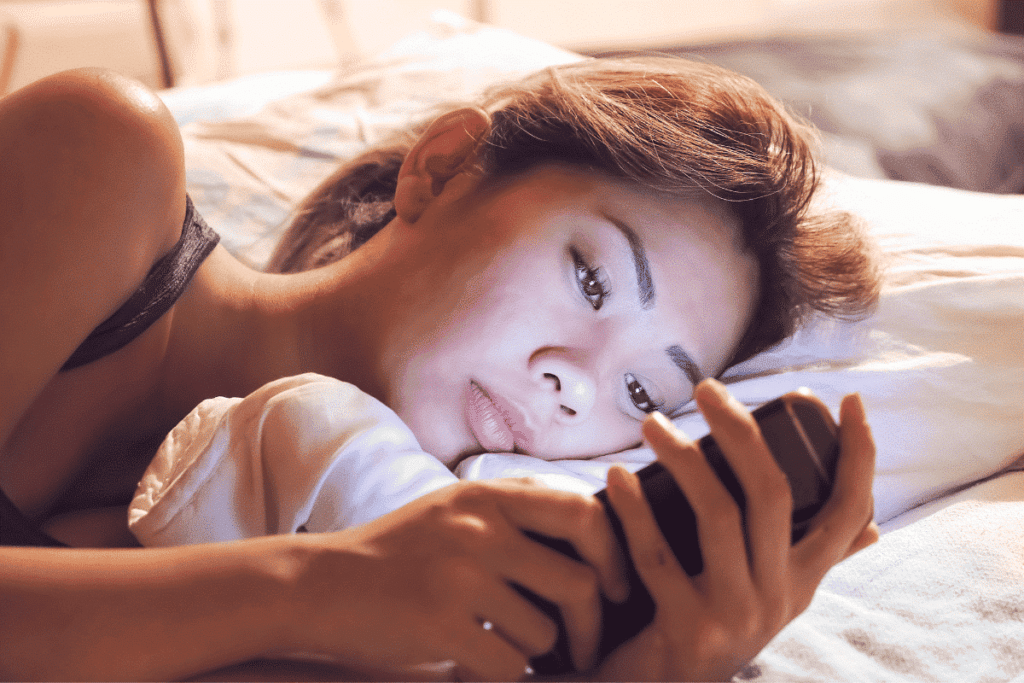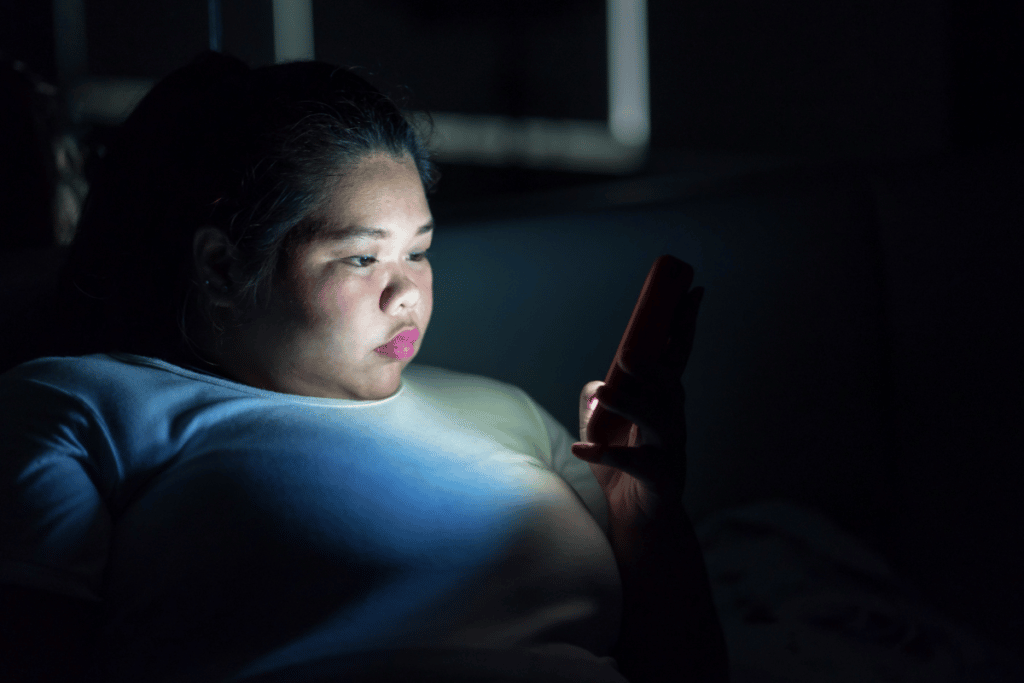Social Media and Sleep Deprivation
Social media and sleep deprivation go hand-in-hand thanks to the addictive algorithms employed by social media companies. Sleep deprivation has serious mental and physical health consequences that can permanently damage children and teens.

- Content last updated on:
- August 14, 2025
Written and edited by our team of expert legal content writers and reviewed and approved by

- Content last updated on:
- August 14, 2025
Teens today are more sleep-deprived than ever before. According to a 2017 study by San Diego University, 40 percent of adolescents slept less than seven hours per night in 2015.
This is 58 percent more than in 1991 and 17 percent more than in 2009. The study noted that the period in 2009 when sleep deprivation increased correlates to the time when smartphone use skyrocketed.
How many hours of sleep do teens need?
Members of the American Academy of Sleep Medicine recommend 8 to 10 hours of sleep per night for teens and 9 to 12 hours for children ages 6 to 12.
Circadian Rhythms in Teens
The National Institute of General Medical Sciences defines circadian rhythms as “the physical, mental, and behavioral changes that follow a 24-hour cycle.” Circadian rhythms are influenced by a combination of internal and external factors. Light, including from electronics, can have a significant impact on circadian rhythms.
As teens enter their high school years, their circadian rhythms shift towards later bedtimes. They function best when they can awaken to sunlight.
Despite the shift, teens with parent-set bedtimes before midnight tend to experience less depression and suicidal thoughts compared to teens with no set bedtime or bedtimes after midnight.
School typically begins early in the day, requiring teens to awaken at early hours that conflict with their biological clocks, which may not allow them to fall asleep prior to 11 p.m. The result is that children and teens tend to be chronically sleep-deprived during the school year.
Adding social media to the mix can make sleep even harder for teens.

How does social media affect sleep?
Social media impacts sleep through multiple mechanisms, including the following:
- The time teens spend on social media, especially late at night
- The impacts of electronics on circadian rhythms
- Social media’s effects on mental health
Sleep Disturbances
A 2019 study published in the Iran Journal of Psychiatry showed a positive correlation between time spent on social media and sleep quality, duration, and the length of time to fall asleep.
The fear of missing out, also known as FOMO, can prevent some teens from falling into a deep sleep because they feel the need to constantly check notifications, even during the night. FOMO drives some teens to sleep with their phones and awaken for every notification.
The Addictive Algorithms
Social media is intentionally addictive for teens because these platforms rely on users spending as much time on them as possible in order to maximize ad revenue, which is their primary source of profit.
The addictive algorithms manipulate the brain reward system and compel teens to engage with social media late into the night, leaving little time for sleep. Each platform has a proprietary technique to facilitate this.
Facebook and Instagram
Meta, the owner of Facebook and Instagram, was exposed by a whistleblower in 2021 for intentionally serving angry, hateful, and polarizing content to users. Facebook’s research revealed that users engage with disturbing content more than with positive content. This makes the disturbing content more profitable.
In addition to creating a real physical addiction, the constant barrage of negative content creates mental health issues like anxiety and depression. Teens on Instagram are encouraged to compare themselves with others, contributing to depression.
As a result, users cannot remove themselves from their social media long enough to get a good night’s sleep. Even if they try, the mental health issues caused by social media exposure often impair sleep. Users may deal with insomnia by engaging in social media, worsening their condition and creating a vicious cycle. The effects that this negative content has on users has led to parents filing lawsuits against Meta on their children’s behalf.
TikTok
TikTok’s own internal documents have revealed that the company uses its understanding of human behavior and responses to social cues to make the app addictive. It is so adept at detecting user preferences that users have observed that the platform seems to know them better than they know themselves.
TikTok’s feed is a never-ending series of short videos carefully selected according to each user’s preferences. Many users intend to use the platform for a few minutes only to find that hours pass. This often occurs at bedtime and drastically cuts into a teen’s sleep schedule on school nights. Lawsuits against TikTok have already been filed for other harms that the app has allegedly caused.
Snapchat
Snapchat uses disappearing content and streaks to pressure users to stay on the platform as long as possible, making it difficult for users to leave the platform at bedtime. If a user is off the platform for too long, they may miss out completely on videos that were posted, and then disappeared, in their absence.
Snapstreaks are established when users engage with each other for consecutive days. Snapchat keeps score, and if one user fails to engage, the streak is broken.
Many young users take on an overwhelming number of streaks and feel intense pressure to stay on the platform throughout the night to keep streaks going and avoid disappointing other users. Similar to the other platforms, lawsuits against Snapchat have also already begun to be filed because of the effects of addiction to the app.
Screen Time
Social media engagement exposes teens to high levels of blue light from their phone screens. Children and teens are more sensitive to the effects of blue light because they have larger pupils that allow more light in.
According to the Sleep Foundation, blue light does the following:
- Influences the circadian rhythm by suppressing melatonin production
- Promotes wakefulness during daytime exposure
- Contributes to insomnia and low-quality sleep during nighttime exposure
In addition to the effects of blue light, the amount of time teens spend viewing their screens causes them to stay up late even when they must rise early for school. Consistently going to bed late throughout the week and catching up on the weekends adversely impacts circadian rhythms and can cause long-term insomnia.
Mental Health
Teens often turn to social media to feel a sense of belonging and security, but when social media is used as a substitute for real-life interactions, this can backfire, leaving teens with increased symptoms of the following:
All of these mental health conditions can impair restful sleep.

The Effects of Sleep Deprivation in Teens
Getting enough sleep is important for more than just feeling well. Sleep is a crucial component of mental and physical health. The effects of sleep deprivation are cumulative. Teens who fail to sleep enough on school nights may be unable to compensate for the sleep debt by oversleeping on the weekends.
The result is that sleep deprivation worsens until the pattern is broken.
Effects of Sleep Deprivation on the Teenage Brain
Quality deep sleep is positively correlated with clear thinking and enables teens to feel less overwhelmed even when they have multiple tasks. Sleep helps regulate emotions. Lack of sleep reduces inhibitions and causes people to be more receptive to negative emotions.
Research shows that sleep deprivation triggers mental health issues and cognitive deficiencies. It is also a major factor in suicide and suicidal thoughts independent of depression or substance use issues. Sleep deprivation can cause or exacerbate the following mental health issues:
- Depression
- Anxiety
- Anger
- Loneliness
Ironically, these are the same issues that drive many people to overuse social media and become sleep deprived, creating yet another vicious cycle. Cognitive processes that are compromised by sleep deprivation include the following:
- Learning
- Memory
- Concentration
- Abstract thinking
- Problem-solving
Physical Effects of Sleep Deprivation
Sleep deprivation compromises the brain’s master clock, which controls the functionality of all internal organs. Chronic sleep deprivation also increases the risk of the following, according to Stanford Children’s Health:
- Obesity
- Diabetes
- Reduced cardiovascular health
- Disordered eating
Sleep-deprived teens are also less likely to engage in exercise or other healthy habits, exacerbating the risk of developing chronic diseases later in life.
Behavioral Effects of Sleep Deprivation
Sleep-deprived teens do not behave in the same manner as teens who are regularly well-rested. Teens that regularly fail to get the rest they need:
- Are increasingly impulsive
- Engage in more high-risk behaviors
- Perform more poorly in academics
- Lose interest in sports, college, and family activities
- Experience more car accidents due to driving while drowsy
How can parents prevent sleep deprivation in teens that use social media?
Parents can help their teens get the rest they need by doing the following:
- Set a bedtime of 11 p.m.
- Restrict screen time at least a full hour before bedtime
- Prohibit phones in the bedroom at night
- Limit social media use to two hours daily
- Encourage your teen to engage in at least 45 minutes of physical activity daily before 7 p.m.
- Monitor your child’s mental health status
- Seek professional help if your teen has developed an addiction to social media
Reach Out to the Social Media Victims Law Center Today
The Social Media Victims Law Center is pioneering the effort to hold social media companies accountable for the harm they are bringing upon a whole generation of children. They will not stop as long as it benefits their bottom line.
If your child is being harmed, contact a social media lawyer today for a free consultation.
